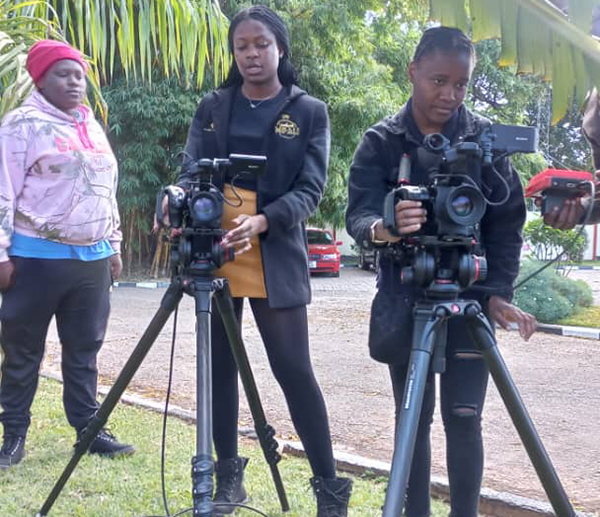Lucia Kim Hamunghete’s love for film came about when her parents used to host people from their street in the Greenwell Matongo residential area to watch TV since they were one of the first families in the neighbourhood to own a DStv decoder.
“I loved how TV made people feel, and I wanted to be part of that. I wanted to be on TV too. I want film to be an everyday thing here as well,” she said. Hamunghete got the opportunity to learn more about the craft as part of the MultiChoice Talent Factory class of 2022, who spent a year in Zambia to develop their talent and engage with one another through their shared filmmaking passions.
Together with fellow Namibians Jerome Claasen, who is also a filmmaker in the making, and Jose Carlos Panduleni Amutenya, who does sound engineering, she learned the tricks of the trade, and is now ready to tell the Namibian story.
They were part of the third intake of Namibians who benefitted from the MultiChoice Talent Factory, which trains and upskills young African creatives by providing them with invaluable hands-on industry experience that will give them the confidence to make it in the world of film.
Hamunghete, who also studied acting in South Africa, is concerned that Namibians try so much to do what South Africans are doing, hence her drive to use her newfound knowledge to empower and educate Namibians through the power of storytelling.
“When you copy someone’s work, one can tell that it is a replica of something, and that to me is not what authenticity is about. You can always tell something is lacking,” she said.
“There are instances where we get people from outside to come and tell our stories. Imagine a person from the outside telling a kasi story; that won’t work! They are more likely to put out what they have heard, but not from experience.” What she learned from the year-long academy is that there’s a great need for collaboration, saying working together has a greater impact, and she intends doing that.
Amutenya too felt the need for collaborations as “two heads are better than one”. “People working together, like producers and artists working with upcoming and emerging ones, I think it will step up the industry, whether music, film or whatever craft it is,” he believes.
Concurring with Hamunghete, Amutenya said there is a need to push more authentic sounds, and not copy what other countries are doing, which is a sign that there is no creativity. “Everyone is doing Amapiano right now, but there is no authenticity. I like what the South Africans have done to hip hop – they have added a lot of traditional elements. Maybe if we come up with our own sounds, we could reach a bigger audience,” added the sound engineer.
On his part, Claasen said collaborations are fruitful ventures for creatives – those upcoming and established – to develop a sense of respect for one another and work together for the greater good of the already inconsistent and crippled industry. He feels Namibians will be more motivated to do better if they are respected and given the right platforms to express their art. “In Zambia, event organisers made sure the first and last acts are local artists, whether there is an international act or not. Local artists get more stage time,” he noted.
Claasen plans on shooting short films, and push out Namibian content through film festivals. “I think I can use my exposure to teach people about filmmaking. One thing I have noticed is that there is a lot of quality content out there, but not the proper promotion of local work. I think through my work, I am equipped enough to aid in that.”
Hamunghete feels there is a lack of understanding about the film industry in Namibia, hence the need to educate people about it. “So, any chance I get, I want to be in a space where I can contribute through film and educate the masses about all things TV.”
– psiririka@nepc.com.na


